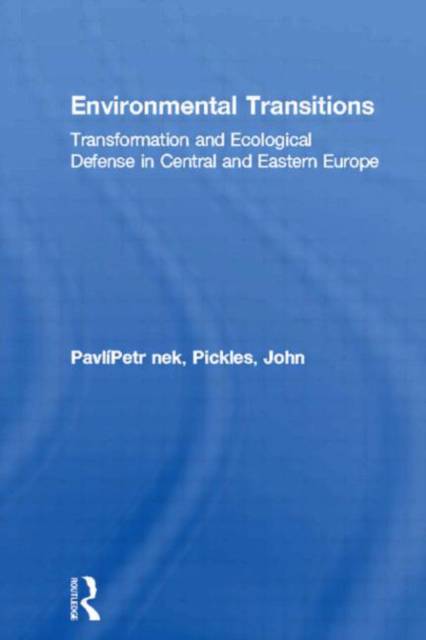
Je cadeautjes zeker op tijd in huis hebben voor de feestdagen? Kom langs in onze winkels en vind het perfecte geschenk!
- Afhalen na 1 uur in een winkel met voorraad
- Gratis thuislevering in België vanaf € 30
- Ruim aanbod met 7 miljoen producten
Je cadeautjes zeker op tijd in huis hebben voor de feestdagen? Kom langs in onze winkels en vind het perfecte geschenk!
- Afhalen na 1 uur in een winkel met voorraad
- Gratis thuislevering in België vanaf € 30
- Ruim aanbod met 7 miljoen producten
Zoeken
Environmental Transitions
Transformation and Ecological Defense in Central and Eastern Europe
Petr Pavlínek, John Pickles
Hardcover | Engels
€ 381,95
+ 763 punten
Uitvoering
Omschrijving
Environmental Transitions is a detailed and comprehensive account of the environmental changes in Central and Eastern Europe, both under state socialism and during the period of transition to capitalism. The change in politics in the late 1980s and early 1990s allowed an opportunity for a rapid environmental clean up, in an area once considered one of the most environmentally devastated regions on earth. The book illustrates how transformations after 1989 have brought major environmental improvements, as well as new environmental problems. It shows how environmental policy, economic change and popular support for environmental movements, have specific and changing geographies associated with them. Environmental Transitions addresses a large number of topics, including the historical geographical analysis of the environmental change, health impacts of environmental degradation, the role of environmental issues during the anti-communist revolutions, legislative reform and the effects of transition on environmental quality after 1989. Environmental Transitions contains detailed case studies from the region, which illustrate the complexity of environmental issues and their intimate relationship with political and economic realities. It gives theoretically informed ideas for understanding environmental change in the context of the political economy of state socialism and post-communist transformations, drawing on a wide body of literature from West, Central and Eastern Europe.
Specificaties
Betrokkenen
- Auteur(s):
- Uitgeverij:
Inhoud
- Aantal bladzijden:
- 384
- Taal:
- Engels
Eigenschappen
- Productcode (EAN):
- 9780415162685
- Verschijningsdatum:
- 15/06/2000
- Uitvoering:
- Hardcover
- Formaat:
- Genaaid
- Afmetingen:
- 162 mm x 241 mm
- Gewicht:
- 725 g

Alleen bij Standaard Boekhandel
+ 763 punten op je klantenkaart van Standaard Boekhandel
Beoordelingen
We publiceren alleen reviews die voldoen aan de voorwaarden voor reviews. Bekijk onze voorwaarden voor reviews.









